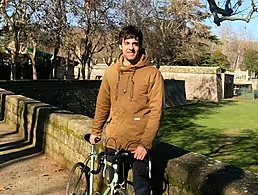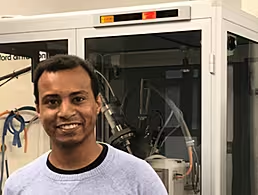Accenture’s Shane O’Neill explains that data science is more than just coding and why the emerging area of digital twins is most interesting to him.
As a data science consultant in Accenture’s applied intelligence practice, Shane O’Neill helps clients unlock value from their data by deriving insights and supporting evidence-based decision-making.
O’Neill joined Accenture in 2018 after getting a master’s in mechanical engineering with business, and has worked across many different parts of the company with a focus on life sciences, retail, sustainability, change management and website analytics.
‘Working as a data scientist means that you can find a job anywhere that uses data’
– SHANE O’NEILL
If there is such a thing, can you describe a typical day in the job?
A typical day for me kicks off with a daily stand-up meeting with my team where we discuss ongoing and upcoming tasks and responsibilities. Here, I can raise questions and draw on the experience of others to close out my tasks.
It is rare that I will have a day with no meetings or client interactions to gather project requirements, understand the business context of a particular issue, or to brainstorm and discuss potential solutions.
Having said that, no day in this role is like the last. The variety of projects and client areas that I work on provide opportunities for me to develop my understanding of complex problems and acquire new skills. I am constantly challenged to grow outside of my comfort zone and think in new ways.
What types of data science projects do you work on?
I’ve worked on a range of data science projects from establishing dashboards and reporting KPIs to inventory modelling and simulation projects.
Of all of these, learning to work in the emerging digital twin space has been the most interesting. Learning how to simulate interrelated activities within certain environments to produce statistical insights has countless applications across almost all industries.
What skills do you use on a daily basis?
It may sound cliché, but I apply a problem-solving mindset to every aspect of my work. Every activity requires me to develop a deeper understanding of certain systems and to extract useful information from it.
However, I find the two most important skills for my day-to-day activities are time management and condensing and translating technical work so that it can be communicated effectively.
Knowing what to say and when, to deliver the most insight to those that do not have the same context, is a very important skill in the field of data science.
What are the hardest parts of working in data science?
Data science can mean many different things to different people.
I’m in a constant state of learning simply because there is so much that data science can cover and there are always new, innovative ways to tackle problems being developed.
The team at Accenture’s applied intelligence practice has such a diverse array of talented and experienced people who are always happy to help troubleshoot and provide different perspectives on a particular issue. They are my first port of call for advice and guidance.
Do you have any productivity tips that help you through the day?
Absolutely. Keep a constant checklist of the tasks that you need to close out that day. Then, create a log of less immediate tasks that can be addressed once your main responsibilities have been taken care of. This always helps me to stay on track.
What skills and tools are you using to communicate daily with your colleagues?
Microsoft Teams has become an indispensable tool for my daily communication. I can easily call someone on my team or quickly send them a message.
How has this role changed as the data science sector has grown and evolved?
The area of data science is constantly expanding thanks to innovative research and evolving client needs.
Cloud technology has enabled a wave of computational advantages that open doors for clients in terms of unlocking the power of their data with lots of plug-and-play solutions available.
The upcoming 5G connectivity and internet of things revolutions are going to push the envelope even further still, heavily relying on smart data practices and analytics to design, monitor and manage systems that produce and interact with mind-boggling amounts of information.
What do you enjoy most about working in data science?
Ultimately, data science is the method of converting data into information. In that regard, working as a data scientist means that you can find a job anywhere that uses data, or wants to use data, to drive decision making.
The projects I have worked on are always different, interesting and challenging, and the possibilities to work across different areas and industries is endless.
It is always rewarding to see your work make an impact, but especially so knowing the rigorous effort that went in to ensuring that the information used to make decisions is backed by sound evidence and insight.
What advice would you give to someone who wants to work in data science?
I think one of the most daunting aspects of data science is that there is so much to know and learn. Don’t be overwhelmed.
If you approach each new problem with curiosity and a growth mindset, you’ll start to recognise patterns and develop a method for breaking down complexity into more process-oriented solutions.
Having programming skills in Python and/or R, the ability to work with visualisation tools like Tableau or Power BI, and an understanding of current machine learning techniques are always useful. Importantly though, data science is not just coding. Learning to work with others to understand the questions they want to answer is probably the most important aspect of the job.
Don’t miss out on the knowledge you need to succeed. Sign up for the Daily Brief, Silicon Republic’s digest of need-to-know sci-tech news.




